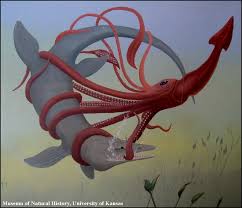Squid

Squids have always fascinated me, and along with snakes they are my favorite animal. Since I know so little about the squid, I decided to research it more.
The squid is actually a mollusk, even though it is nothing like its relatives, the snail and the clam. The squid has a soft outer shell and inner shell, unlike most mollusks which have a hard outer shell. Squids, along with octopi and nautili, are Cephalopods meaning "head footed." Octopi have eight arms, making them octopods, while squid have ten, making them decopods.
 |
The male squids have exciting colors that attract females during mating time, and the female chooses a male squid to mate with. The females have an ink sac hidden under a set of glands in the gills. When squids mate, the sperm is placed in the sac for her eggs to be fertilized. |
Squids Will be Squids
 My tentacles are twirling,
My tentacles are twirling,
my tentacles are curling
and as for all the crew,
it's vomit they are hurling.
The ship goes up,
the ship goes down,
Up! ... Down! ... Up! ... Down!
 and all the sailors start to drown.
and all the sailors start to drown.
I'm having so much fun!
And it's only just begun!
For next I'm going to eat them -
each and every one!
My tentacles are tightening,
my tentacles are whitening
and faces all are going blue
O! How my day is brightening!
Such fun, such fun on the ocean wave,
O wow, I'm having such a rave!
Ouch! Oohh! My mum, that monster squid,
has caught me out; she yells 'BEHAVE!!!!!'
Her tentacles are flaring, tearing
and epithets she's wildly swearing.
'It's time,' she screeches 'for you to go to bed,
so stop your mayhem and your scaring!'
-Poem by Suecat
( http://allpoetry.com/poem/9452293-Squids-Will-be-Squids-by-suecat )
 Albinism (meaning "white," also called achromia, achromasia, or achromatosis) is a disorder characterized by the complete or partial absence of pigment in the skin, hair and eyes. The disorder occurs due to lack-of or malfunction of tyrosinase, an enzyme involved in the production of melanin.
Albinism (meaning "white," also called achromia, achromasia, or achromatosis) is a disorder characterized by the complete or partial absence of pigment in the skin, hair and eyes. The disorder occurs due to lack-of or malfunction of tyrosinase, an enzyme involved in the production of melanin.